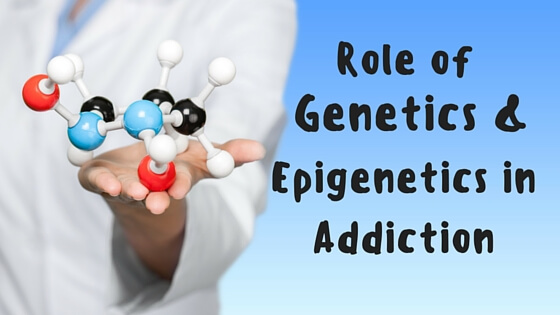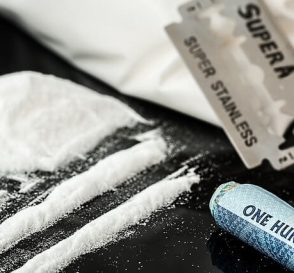What is the effect of genetics?
In 2004, investigators identified a specific protein PSD-95, which was found to be associated with reduced intelligence and increased sensitivity to cocaine. Ever since, researchers and scientists have been working on genome-wide linkage and association studies that have slowly but steadily implicated several regions and genes responsible for addiction to substance use.
This belief was also supported by the fact that addiction ran in families and children of addicts are 8 times more predisposed to developing addiction.
Now it is proven, that substance dependence is influenced genetically and this genetic influence is complex, playing out in a way other than the Mendelian mode. A multitude of alleles are responsible, some of which have been identified while some not. But, despite genetic predisposition, there is a necessary component of gene-by-environment interaction, i.e. a person cannot become addicted without exposure, despite the presence of pro-addictive genes.

Why are there genes for addiction?
Since the human evolution, the brain is programmed to derive pleasure from activities that humans liked. It provided evolutionary benefit for the Homo sapiens to survive. So basically, the potential for addiction is already hardwired into our brain and system. Every time you use a drug or booze, you strengthen the link between substance addiction and the pleasure derived. Once you wire the association permanently, you’ll end up chasing drugs and alcohol more vehemently. The brain gets rewired to respond strongly to drugs of abuse and weakly to other pleasurable activities.
But genes are not the sole reason for predisposition to drug addiction. It depends, in equal parts, on your coping skills. Strong coping skills have allowed many people to lead normal lives despite coming from families with strong addiction histories. You can pass on your legacy of healthy coping skills to your future generations.
Which genes have been implicated in addiction?
Neurobiology researchers have mapped the DNA sequences to find genes that influence the predilection towards substance use. Each gene, which gets identified, acts as a potential new ‘drug-target’ for treatment. After PSD-95 protein, Dr. Paul Greenard discovered that virtually every drug addiction was associated with a brain protein DARPP-32.
Removal of this protein in mice was shown to obviate the effect of drugs of abuse. In some individuals, the greater number of receptors in the nucleus-accumbens leads to a greater effect of dopamine-reward system and a more pleasurable feeling e.g. the involvement of D2 dopamine receptor gene (DRD2) in alcohol dependence.
Recommended Article: How Overcoming Drug Addiction Can Help in Leading Better Life
In some, it has been shown that the substance is metabolized more quickly than in other individuals causing quick washout of the substance and the need to take again and in larger quantities.
Some genes are also protective against addiction. CYP2A6 gene is more prevalent among non-smokers. It causes the carriers to feel nauseous and dizzy from smoking.
Genetics in cross addiction:
Addiction to any substance whether alcohol, cocaine, drugs or antidepressants, works in the same part of the brain. Thus, addiction to one drug can lead you to develop an addiction to any other substance use and make you relapse on other drugs. If you leave one substance use to develop another, you would still be relying on it to escape, relax or reward yourself. In other words, recovery requires total abstinence from all kinds of drugs.
Gene Therapy:
[su_highlight background=”#de1427″ color=”#ffffff”]Gene therapy is introducing normal genes through vectors, which go and replace defective or absent genes[/su_highlight]. As we work on genetics and epigenetics underlying drug use, we are beginning to understand the effect of drugs on the activity level of genes. Such epigenetic studies can point to specific genes and proteins that drugs activate or silence. If we can reverse those effects, we will have a powerful tool to prevent and treat addiction.
Gene therapy in addicts: How science is tackling addiction
There are different studies that have yielded interesting results from studying the effect of gene manipulation in addicts. I am recuperating a few of these studies.
1. Drugs cause supra-physiological stimulation of receptors (more than physiological limits). It can lead to depressed activity of certain areas in the brain. This resets the threshold for stimulation, leading to substance abuse for increasing the activity of these hypoactive brain areas. The study showed how gene therapy could be used to enhance DA function within the body and restore brain circuits for treating addiction and compulsive administration.
2. Cocaine mimics neurotransmitters in the brain and produces an enhanced effect, resembling chemical transmitters, on neurons. In 2008, a study found out that cocaine is removed from circulation by BChE gene. This flushes out the drug before it reaches the brain. The gene is less active in addicts. This study looked at the prospects of increasing the gene activity of BChE to reduce cocaine dependence.
3. Use of nanotechnology: The study done in 2009 was targeted at observing the potential of utilizing siRNA nanoplexes to target dopaminergic-signaling pathway in the brain. This is the chiefly involved pathway in addiction development. Gold nanorod-DARPP-32 complexes were used to silence genes responsible for producing key proteins in addiction viz. DARPP-32, ERK and PP-1.
The nanoplexes offered brain specific delivery and found to be highly effective for treating drug addiction and other brain diseases.
Drug addiction is very similar to other chronic illnesses. It is in some parts influenced by unhealthy lifestyles and in some by genes. Interpreting it as a diseasing and receiving treatment gives more promising results than just ‘trying to be strong’. It thus shares many traits with diseases, one of which is, heritability. It is now becoming a constant effort to investigate how genes can make a person vulnerable to, or protect against addiction. This will provide new avenues for tackling addiction through the approach of gene therapy. We are now looking at the future of addiction treatment.



